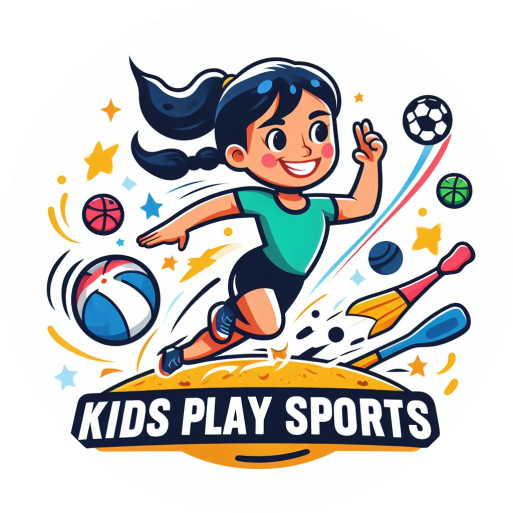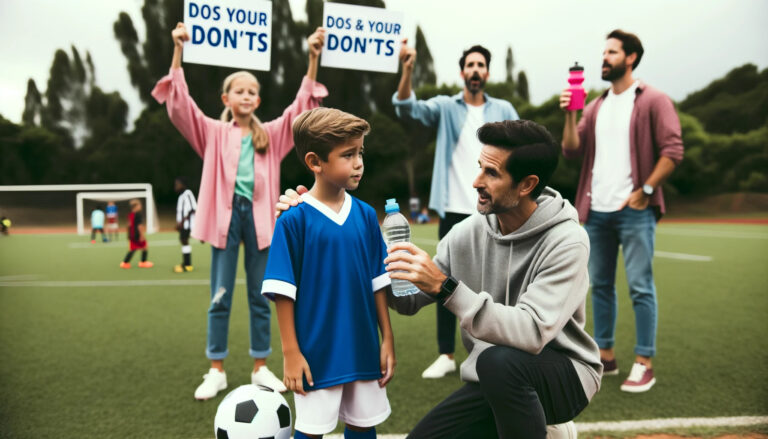The Importance of Teamwork and Communication Skills in Children’s Sports
- The Importance of Rest and Recovery in Young Athletes’ Regimens - October 23, 2023
- Boosting Stamina and Endurance in Young Athletes: Tips and Tricks - October 23, 2023
- The Role of Coaches in Shaping Young Athletes - October 23, 2023
Understanding the Role of Teamwork in Youth Sports
Team sports are more than just an amalgamation of skilled players; they rely heavily on the essence of teamwork. This concept is even more significant in youth sports where players are still figuring out their skills, strengths, and weaknesses. Teamwork in youth sports is the collective will and effort of the team to accomplish a common goal, setting personal ambitions aside. It goes beyond mere talent, emphasizing the importance of cooperation, cohesiveness, and mutual respect among team members.
Promoting teamwork in youth sports from early stages can form critical habits and set the right mindset for children. They learn that every role holds significance to the overall success of the team, along with the importance of supporting one another on and off the field. Youth sports introduce children to the concept of interdependency in which every player has a role to fulfill for the team’s combined success, hence encouraging them to value each player’s contribution.
The Impact of Effective Communication on a Child’s Game Performance
In youth sports, communication plays a pivotal role in shaping a child’s game performance. It does not solely pertain to verbal instructions given by coaches or team strategies discussed among players but largely envelops non-verbal cues as well. Uniform understanding of both these elements allows children to predict their teammates’ actions and make coordinated efforts during gameplay. This coordinated interplay results in a smooth execution of planned strategies, enhancing the collective game performance.
Conversely, a lack of effective communication can lead to misunderstandings and disjointed game-play. When children cannot effectively convey or understand messages, it potentially causes misalignment of strategies and confusion among team members. For example, a player may read the game differently than what the team has planned, leading to missed scoring opportunities or poor defensive plays. Thus, effective communication undeniably influences a child’s game performance significantly.
How Sports Help to Develop Communication Skills in Kids
Sports activities provide an excellent platform for children to improve their interpersonal and communication skills. From the minute a child steps onto a playing ground, he or she quickly learns the importance of expressing ideas and strategies to peers and coaches. Active participation in sports necessitates continuous verbal and non-verbal interactions that bolster a child’s ability to communicate effectively. The amount of coordination, negotiation, and mutual understanding required in team play means that children must focus on developing clear, concise, and efficient communication.
The role a child plays in a team activity also imparts valuable lessons in communication. Whether as a leader who instills assurance and strategy or a teammate lending support and motivation, children quickly comprehend the different ways to interact, reinforcing their speech and body language. Furthermore, dealing with occasional mishaps, slips, or plain bad luck fosters resilience and teaches them to express their frustrations positively. Therefore, sports serves as a fertile field for cultivating adaptable communicators right from their formative years.
Why Teamwork is Essential in Children’s Sports Activities
Teamwork plays a crucial role in children’s sports because it helps young players learn to collaborate and interact with each other in a constructive manner. Nurturing these skills from an early age enables them to understand the dynamics of working together towards a common goal. They learn to respect the differing skills and abilities of others and the valuable role each team member has in contributing to the team’s overall success.
Moreover, aside from the technical and strategic aspects of the game, children’s sports activities facilitate the development of children’s social skills, such as communication and cooperation. Participating in sports also helps children form friendships built on mutual respect and shared experiences, which help in their emotional development. Through teamwork, children learn to understand the importance of social interaction and collaboration, which are fundamental skills that will help them in many aspects of life.
The Link Between Sports Participation and Improved Communication Skills
Engaging in sports activities provides a unique platform for children to improve their communication skills in a practical and dynamic environment. Being a part of a sports team involves comprehending complex strategies, considering suggestions from coaches and teammates, and making decisions under pressure. All of these necessitate effective and timely communication within the team. Thus, sports participation bolsters children’s communication skills by making them active listeners, responsive reciprocators, and thoughtful conveyors of essential information.
Sports encourage children to articulate their thoughts and strategies clearly and succinctly. This not only boosts their expressive skills but also adds to their ability to adapt their communication style according to situational demands. Besides, participating in sports also facilitates adjustment to varying communication patterns, and adaptation to diverse team dynamics. Essentially, by taking part in sports, children practice and enhance their executive function skills, including problem-solving, planning, and decision-making – all of which are interwoven with efficient communication.
Developing Teamwork Abilities in Kids Through Sports
Participation in sports from an early age offers children the opportunity to develop and reinforce their teamwork skills. In team sports, cooperation is essential for success. Young athletes learn the value of working as a unit towards a common goal. Each team member must utilize their strengths while compensating for the weaknesses of their peers. They understand the importance of sharing responsibilities, supporting each other, and the crucial role every member plays in the team’s overall success.
Furthermore, sports provide a platform for introducing and fostering healthy competition among kids. These competitive environments inevitably produce situations where conflict arises, a complex dynamic that children must navigate. It is in this setting that they begin to grasp the art of compromise. They rapidly evolve to understand that the goal of winning can only be achieved when individuals put aside personal glory for the collective benefit of the team. These are but a few of the raft of experiences through which sports instill teamwork abilities in kids. Consequently, these experiences can shape their future interactions in various aspects of their lives, such as in educational settings, future workplaces, and their engagement in community initiatives.
Enhancing Communication Skills in Children via Sporting Activities
Sports activities provide an ideal setting for children to enhance their communication skills in an engaging and dynamic manner. They act as community bubbles, bringing individuals together from various racial, cultural, and social backgrounds, thus enabling children to learn about cultural sensitivity and effective communication. With constant interactions, be it amongst teammates, against opponents or with coaches, children are naturally placed in an array of situations that require clear and efficient communication to successfully navigate the playing field. From complex football strategies to simple netball passes, the essence of every move lies in collaboration and communication precision.
Through sports, children not only grasp the necessity of coherent communication, but they also witness the potential consequences of miscommunication, both of which inherently improve their interaction abilities. Learning to express themselves accurately on a sports pitch can greatly reduce misunderstandings, prevent conflicts and collectively enhance the performance of a team. For instance, in cricket, a critical call between two batsmen can be the difference between victory and defeat, which underscores its centrality in successful sports performance. Hence, sports provide a real life, non-condescending model for children to understand the gravity and relevance of capable communication skills.
Ways to Foster Team Spirit and Communication in Youth Sports
Creating an environment that nurtures team spirit and fosters communication in youth sports could be achieved through a series of deliberate activities. Coaches could start by setting clear expectations and goals that are focused on promoting unity and encouraging dialogue. Emphasizing the importance of each player’s contribution to the team and ensuring they understand their role could pave way for an enhanced team spirit. Instilling a culture of mutual respect and practicing fair play can as well contribute to the overall camaraderie among team members.
On the other hand, effective communication is strengthened by incorporating active listening and open ended activities that necessitate dialogue among teammates. Coaches can encourage young athletes to express their thoughts, listen to others and respond constructively. Role play activities can be used as well to simulate game situations where players have to communicate to solve problems collectively. These practices would not only promote communication in the field but also foster valuable life skills in the young athletes.
Long-Term Benefits of Learning Teamwork and Communication Skills in Sports for Kids
Participation in sports at an early age is a key component in modeling a child’s behavior, shaping their personality, and fostering skills that have long-lasting impacts well into their adulthood. It’s imperative to mention the considerable impact it has particularly in enhancing teamwork and communication skills. Engaging in sports encourages children to work collaboratively towards a common goal. They learn to coordinate their individual efforts as a collective team, realizing that a successful team performance is more than just individual success. This significantly leads to the development of their team spirit and cooperation skills, attributing to their personal and professional life in the future.
In addition to fostering teamwork, sports act as a critical platform for children to develop their verbal and non-verbal communication skills. Children learn to articulate their thoughts, listen to others, interpret body language and communicate strategic plans – all within the confines of a game. In doing so, they ultimately improve their interpersonal skills which are essential in any social situation. Consequently, these fine-tuned communication skills play a pivotal role in their personal relationships and professional endeavors, giving them a competitive edge in this ever-globalized world. The long-term benefits of learning teamwork and communication skills through sports are thus profound and far-reaching.
Case Studies: Successful Teamwork and Communication in Children’s Sports
In a recent study conducted with youth soccer players, a striking correlation was observed between successful teamwork and a team’s overall performance. Players who demonstrated good communication skills not only performed better individually but also contributed more significantly towards their team’s success. It was clear from observations that effective communication fostered a strong sense of team spirit, led to improved coordination and resulted in critical game-changing tactics.
A parallel study concentrated on a young basketball team also suggests the significance of teamwork and communication. Over the course of a single season, the team’s coach focused mainly on enhancing communication among team members and cultivating a cooperative team environment. By the end of the season, a noticeable improvement in the team’s defensive strategy was seen, largely attributed to the enhanced communication channels established by the players. Players became more in-sync with each other’s movements and showed great efficacy in their on-court exchanges – a testament to the power of teamwork and communication.
What is the role of teamwork in youth sports?
Teamwork is vital in youth sports as it encourages cooperation, builds character, and teaches children how to work with others to achieve a common goal. It also develops leadership skills and fosters a sense of community among the team members.
How does effective communication impact a child’s game performance?
Effective communication in sports can greatly enhance a child’s game performance. It helps in understanding strategies and plays, promotes team cohesion, and reduces misunderstandings. It also boosts confidence and motivates the child to give their best.
How can sports help to develop communication skills in kids?
Sports provide a practical and enjoyable way for kids to develop communication skills. They learn to express themselves, listen to others, understand non-verbal cues, and work together towards a common goal. This can greatly benefit them not only in sports, but also in other areas of life.
Why is teamwork essential in children’s sports activities?
Teamwork is essential in children’s sports activities as it helps children learn to respect others, appreciate different skills and roles, handle wins and losses gracefully, and work together to overcome challenges. It shapes their character and prepares them for future team situations in life and work.
Can sports participation improve communication skills in children?
Yes, sports participation can significantly improve communication skills in children. They learn how to effectively convey their thoughts and ideas, listen to others, cooperate, and resolve conflicts, all of which are key components of effective communication.
How can sports help in developing teamwork abilities in kids?
Sports encourage kids to work together as a unit to achieve a common objective, thereby developing their teamwork abilities. It also teaches them about shared responsibility, trust, and respect for different roles within a team.
How can sporting activities enhance children’s communication skills?
Sporting activities can enhance children’s communication skills by providing opportunities to interact with peers and coaches, understand instructions and strategies, express their own ideas, and respond to feedback. This hands-on approach can significantly improve their verbal and non-verbal communication skills.
What are some ways to foster team spirit and communication in youth sports?
Some ways to foster team spirit and communication in youth sports include promoting open communication, encouraging cooperation, setting common goals, recognizing individual efforts, and creating a supportive and inclusive environment.
What are the long-term benefits of learning teamwork and communication skills in sports for kids?
The long-term benefits of learning teamwork and communication skills in sports for kids include improved social skills, higher self-esteem, better problem-solving abilities, enhanced leadership skills, and greater adaptability in different social and professional settings in the future.
Can you provide some case studies that demonstrate successful teamwork and communication in children’s sports?
While the article provides various case studies, detailed specifics can vary. Usually, these case studies highlight instances where effective teamwork and communication have led to improved performance, greater team cohesion, and a more positive sporting experience for children.



